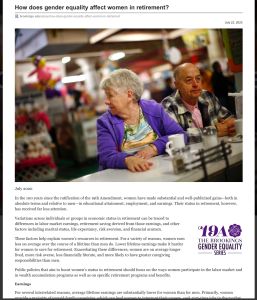Únase a getAbstract para acceder al resumen.

Únase a getAbstract para acceder al resumen.
Grace Enda and William G. Gale
How Does Gender Equity Affect Women in Retirement?
Brookings Institution, 2020
¿De qué se trata?
The 19th Amendment has improved gender equality, but retired women still face poverty.
Recommendation
Brookings Institution economic policy researchers William Gale and Grace Enda explain how the 19th Amendment overlooked issues of female poverty in retirement and offer ideas for rectifying the gaps. Women have less money in retirement due to their longevity and caregiving roles as well as – in the United States – the impact of government policies. To lessen the number of elderly women below the poverty line, the government could change how it calculates Social Security benefits and implement an “automatic IRA program.” This report provides important information for policy-makers, elected officials, HR directors and women dealing with retirement.
Summary
About the Authors
William G. Gale is director of the Retirement Security Project for the Brookings Institution as well as a senior fellow. Grace Enda is a senior research assistant in the Economic Studies program.



















Comment on this summary